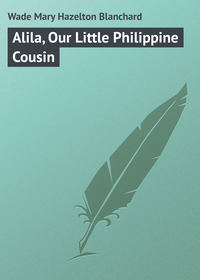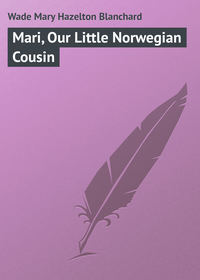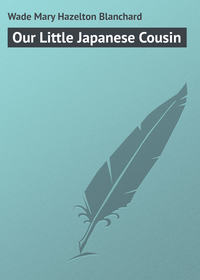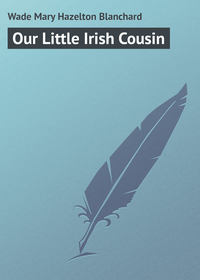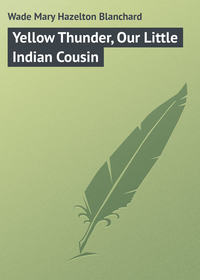 полная версия
полная версияOur Little German Cousin
"I know where you would like to go in our own country," said Bertha.
"To Berlin, of course. What a grand city it must be! Father has been there. Our schoolmaster was there while he served his time as a soldier. At this very moment, it almost seems as though I could hear the jingling of the officers' swords as they move along the streets. The regiments are drilled every day, and I don't know how often the soldiers have sham battles."
Hans jumped up from his seat under the tree and began to march up and down as though he were a soldier already.
"Attention, battalion! Forward, march!" Bertha called after him. But she was laughing as she spoke. She could not help it, Hans looked so serious. At the same time she couldn't help envying her brother a little, and wishing she were a boy, too. It must be so grand to be a soldier and be ready to fight for the emperor who ruled over her country.
"The schoolmaster told us boys yesterday about the grand palace at Berlin. The emperor lives in it when he is in the city," said Hans, wheeling around suddenly and stopping in front of Bertha.
"I think you must have caught my thoughts," said the little girl, "for the emperor was in my mind when you began to speak."
"Well, never mind that. Do you wish to hear about the palace?"
"Of course I do, Hans."
"The schoolmaster says it has six hundred rooms. Just think of it! And one of them, called the White Room, is furnished so grandly that 2,400,000 marks were spent on it. You can't imagine it, Bertha, of course. I can't, either."
A German mark is worth about twenty-four cents of American money, so the furnishing of the room Hans spoke of must have cost about $600,000. It was a large sum, and it is no wonder the boy said he could hardly imagine so much money.
"There are hundreds of halls in the palace," Hans went on. "Some of their walls are painted and others are hung with elegant silk draperies. The floors are polished so they shine like mirrors. Then the pictures and the armour, Bertha! It almost seemed as though I were there while the schoolmaster was describing them."
"I never expect to see such lovely things," said his sober little sister. "But perhaps I shall go to Berlin some day, Hans. Then I can see the statue of Frederick the Great, at any rate."
"It stands opposite the palace," said her brother, "and cost more than any other bronze statue in the world."
"How did you learn that, Hans?"
"The schoolmaster told us so. He said, too, that it ought to stir the blood of every true German to look at it. There the great Frederick sits on horseback, wearing the robe in which he was crowned, and looking out from under his cocked hat with his bright, sharp eyes. That statue alone is enough to make the soldiers who march past it ready to give their lives for their country."
"He lived when the different kingdoms were separated from each other, and there was no one ruler over all of them. I know that," said Bertha.
"Yes, he was the King of Prussia. And he fought the Seven Years' War with France and came out victorious. Hardly any one thought he could succeed, for there was so much against him. But he was brave and determined. Those two things were worth everything else."
"That wasn't the only war he won, either, Hans."
"No, but it must have been the greatest. Did you know, Bertha, that he was unhappy when he was young? His father was so strict that he tried to run away from Germany with two of his friends. The king found out what they meant to do. One of the friends was put to death, and the other managed to escape."
"What did his father do to Frederick?" Bertha's eyes were full of pity for a prince who was so unhappy as to wish to run away.
"The king ordered his son to be put to death. But I suppose he was angry at the time, for he changed his mind before the sentence was carried out, and forgave him."
"I wonder how kings and emperors live," said Bertha, slowly. It seemed as though everything must be different with them from what it was with other people.
"I'll tell you about Frederick, if you wish to listen."
"Of course I do, Hans."
"In the first place, he didn't care anything about fine clothes, even if he was a king and was born in the grand palace at Berlin. His coat was often very shabby.
"In the next place, he slept only about four hours out of the whole twenty-four for a good many years. He got up at three o'clock on summer mornings, and in the winter-time he was always dressed by five, at the very latest.
"While his hair-dresser was at work, he opened his most important letters. After that, he attended to other business affairs of the country. These things were done before eating or drinking. But when they had been attended to, the king went into his writing-room and drank a number of glasses of cold water. As he wrote, he sipped coffee and ate a little fruit from time to time.
"He loved music very dearly, and sometimes rested from his work and played on his flute.
"Dinner was the only regular meal of the day. It was served at twelve o'clock, and lasted three or four hours. There was a bill of fare, and the names of the cooks were given as well as the dishes they prepared."
"Did the king ever let them know whether he was pleased or not with their cooking?" asked Bertha.
"Yes. He marked the dishes he liked best with a cross. He enjoyed his dinner, and generally had a number of friends to eat with him. There was much joking, and there were many clever speeches.
"When the meal was over, the king played on his flute a short time, and then attended to more business."
"Did he work till bedtime, Hans?"
"Oh, no. In the evening there was a concert or lecture, or something like that. But, all the same, the king was a hardworking man, even in times of peace."
"He loved his people dearly, father once told me," said Bertha. "He said he understood his subjects and they understood him."
"Yes, and that reminds me of a story the schoolmaster told. King Frederick was once riding through the street when he saw a crowd of people gathered together. He said to his groom, 'Go and see what is the matter.' The man came back and told the king that the people were all looking at a caricature of Frederick himself. A caricature, you know, is a comical portrait.
"Perhaps you think the king was angry when he heard this. Not at all. He said, 'Go and hang the picture lower down, so they will not have to stretch their necks to see it.'
"The crowd heard the words. 'Hurrah for the king!' they cried. At the same time, they began to tear the picture into pieces."
"Frederick the Great could appreciate a joke," said Bertha. "I should think the people must have loved him."
"He had some fine buildings put up in his lifetime," Hans went on. "A new palace was built in Berlin, besides another one the king called 'Sans Souci.' Those are French words meaning, 'Without a Care.' He called the place by that name because he said he was free-hearted and untroubled while he stayed there.
"I've told you these things because you are a girl. But I'll tell you what I like to think of best of all. It's the stories of the wars in which he fought and in which he showed such wonderful courage. So, hurrah for Frederick the Great, King of Prussia!"
Hans made a salute as though he stood in the presence of the great king. Then he started for the wood-pile, where he was soon sawing logs with as much energy as if he were fighting against the enemies of his country.
CHAPTER VII.
THE BRAVE PRINCESS
"Listen, children! That must be the song of a nightingale. How sweet it is!"
It was a lovely Sunday afternoon. Every one in the family had been to church in the morning, and come home to a good dinner of bean soup and potato salad. Then the father had said:
"Let us take a long walk over the fields and through the woods. The world is beautiful to-day. We can enjoy it best by leaving the house behind us."
Some of the neighbours joined the merry party. The men smoked their pipes, while the women chatted together and the children frolicked about them and picked wild flowers.
How many sweet smells there were in the fields! How gaily the birds sang! The air seemed full of peace and joy.
They all wandered on till they came to a cascade flowing down over some high rocks. Trees grew close to the waterfall, and bent over it as though to hide it from curious eyes. It was a pretty spot.
"Let us sit down at the foot of this cascade," said Bertha's father. "It is a pleasant place to rest."
Every one liked the plan. Bertha nestled close to her father's side.
"Tell us a story. Please do," she said.
"Ask neighbour Abel. He knows many a legend of just such places as this. He has lived in the Hartz Mountains, and they are filled with fairy stories."
The rest of the party heard what was said.
"Neighbour Abel! A story, a story," they cried.
Of course the kind-hearted German could not refuse such a general request. Besides, he liked to tell stories. Taking his long pipe out of his mouth, he laid it down on the ground beside him. Then he cleared his throat and began to speak.
"Look above you, friends. Do you see that mark on the rocky platform overhead? I noticed it as soon as I got here. It made me think of a wild spot in the Hartz Mountains where there is just such a mark. The people call it 'The Horse's Hoof-print.' I will tell you how they explain its coming there.
"Once upon a time there was a beautiful princess. Her name was Brunhilda, and she lived in Bohemia. She lived a gay and happy life, like most young princesses, till one day a handsome prince arrived at her father's palace. He was the son of the king of the Hartz country.
"Of course, you can all guess what happened. The prince fell in love with the princess, and she returned his love. The day was set for the wedding, and the young prince went home to prepare for the great event.
"But he had been gone only a short time when a powerful giant arrived at Brunhilda's home. He came from the far north. His name was Bodo.
"He asked for the princess in marriage, but her heart had already been given away. She did not care for the giant, even though he gave her the most elegant presents, – a beautiful white horse, jewels set in gold, and chains of amber.
"'I dare not refuse the giant,' said Brunhilda's father. 'He is very powerful, and we must not make him angry. You must marry him, my daughter, in three days.'
"The poor maiden wept bitterly. It seemed as though her heart would break. But she was a clever girl, and she soon dried her tears and began to think of some plan by which she might yet be free. She began to smile upon the giant and treat him with great kindness.
"'I should like to try the beautiful horse you brought me,' she said to him. He was much pleased. The horse was brought to the door. The princess mounted him and rode for a time up and down in front of the palace.
"The very next day was that set apart for the wedding. The castle was filled with guests who feasted and made merry. The giant entered into everything with a will. He laughed till the floors and walls shook. Little did he think what was taking place. For the princess slipped out of the castle when no one was watching, hurried into the stable, and leaped upon the back of her swift white horse.
"'Lower the drawbridge instantly,' she called to the guard. She passed over it, and away she flew like the wind.
"You were too late, too late, O giant, when you discovered that Brunhilda was missing.
"He flew out of the castle, and on the back of his own fiery black horse he dashed after the runaway princess.
"On they went! On, on, without stopping. Over the plains, up and down the hillsides, through the villages. The sun set and darkness fell upon the world, but there was never a moment's rest for the maiden on the white horse or the giant lover on his black steed.
"Sometimes in the darkness sparks were struck off from the horses' hoofs as they passed over rough and rocky places. These sparks always showed the princess ahead and slowly increasing the distance between herself and her pursuer.
"When the morning light first appeared, the maiden could see the summit of the Brocken ahead of her. It was the home of her lover. Her heart leaped within her. If she could only reach it she would be safe.
"But alas! her horse suddenly stood still. He would not move. He had reached the edge of a precipice. There it lay, separating the princess from love and safety.
"The brave girl had not a moment to lose. The giant was fast drawing near. She wheeled her horse around; then, striking his sides a sharp blow with her whip, she urged him to leap across the precipice.
"The spring must be strong and sure. It was a matter of life and death. The chasm was deep. If the horse should fail to strike the other side securely, it meant a horrible end to beast and rider.
"But he did not fail. The feet of the brave steed came firmly down upon the rocky platform. So heavily did they fall that the imprint of a hoof was left upon the rock.
"The princess was now safe. It would be an easy matter for her to reach her lover's side.
"As for the giant, he tried to follow Brunhilda across the chasm. But he was too heavy and his horse failed to reach the mark. The two sank together to the bottom of the precipice."
Every one thanked the story-teller, and begged him to tell more of the Hartz Mountains, where he had spent his boyhood days. The children were delighted when he spoke of the gnomes, in whom he believed when he was a child.
"Every time I went out in the dark woods," he said, "I was on the lookout for these funny little fairies of the underground world. I wanted to see them, but at the same time I was afraid I should meet them.
"I remember one time that my mother sent me on an errand through the woods at twilight. I was in the thickest part of the woods, when I heard a sound that sent a shiver down my back.
"'It is a witch, or some other dreadful being,' I said to myself. 'Nothing else could make a sound like that.' My teeth chattered. My legs shook so, I could hardly move. Somehow or other, I managed to keep on. It seemed as though hours passed before I saw the lights of the village. Yet I suppose it was not more than fifteen minutes.
"When I was once more safe inside my own home, I told my father and mother about my fright.
"'It was no witch, my child,' said my father. 'The sound you describe was probably the cry of a wildcat. I thank Heaven that you are safe. A wildcat is not a very pleasant creature to meet in a lonely place.'
"After that, I was never sent away from the village after dark.
"My boy friends and I often came across badgers and deer, and sometimes foxes made their way into the village in search of poultry, but I never came nearer to meeting a wildcat than the time of which I have just told you."
"What work did you do out of school hours?" asked Hans. The boy was thinking of the toys he had to carve.
"My mother raised canary-birds, and I used to help her a great deal. Nearly every woman in the village was busy at the same work. What concerts we did have in those days! Mother tended every young bird she raised with the greatest care. Would it become a good singer and bring a fair price? We waited anxiously for the first notes, and then watched to see how the voices gained in strength and sweetness.
"It was a pleasant life, and I was very happy among the birds in our little village. Would you like to hear a song I used to sing at that time? It is all about the birds and bees and flowers."
"Do sing it for us," cried every one.
Herr Abel had a good voice and they listened with pleasure to his song. This is the first stanza:
"I have been on the mountainThat the song-birds love best.They were sitting, were flitting,They were building their nest.They were sitting, were flitting,They were building their nest."After he had finished, he told about the mines in which some of his friends worked. It was a hard life, with no bright sunlight to cheer the men in those deep, dark caverns underground.
"Of course you all know that the deepest mine in the world is in the Hartz Mountains."
His friends nodded their heads, while Hans whispered to Bertha, "I should like to go down in that mine just for the sake of saying I have been as far into the earth as any living person."
"The sun is setting, and there is a chill in the air," said Bertha's father. "Let us go home."
CHAPTER VIII.
WHAT THE WAVES BRING
Bertha's mother had just come in from a hard morning's work in the fields. She had been helping her husband weed the garden.
She spent a great deal of time outdoors in the summer-time, as many German peasant women do. They do a large share of the work in ploughing the grain-fields and harvesting the crops. They are much stronger than their American cousins.
"Supper is all ready and waiting for you," said Bertha.
The little girl had prepared a dish of sweet fruit soup which her mother had taught her to make.
"It is very good," said her father when he had tasted it. "My little Bertha is getting to be quite a housekeeper."
"Indeed, it is very good," said her mother. "You learned your lesson well, my child."
Bertha was quite abashed by so much praise. She looked down upon her plate and did not lift her eyes again till Gretchen began to tell of a new amber bracelet which had just been given to one of the neighbours.
"It is beautiful," said Gretchen, quite excitedly. "The beads are such a clear, lovely yellow. They look so pretty on Frau Braun's neck, I don't wonder she is greatly pleased with her present."
"Who sent it to her?" asked her mother.
"Her brother in Cologne. He is doing well at his trade, and so he bought this necklace at a fair and sent it to his sister as a remembrance. He wrote her a letter all about the sights in Cologne, and asked Frau Braun to come and visit him and his wife.
"He promised her in the letter that if she would come, he would take her to see the grand Cologne cathedral. He said thousands of strangers visit it every year, because every one knows it is one of the most beautiful buildings in all Europe.
"Then he said she should also see the Church of Saint Ursula, where the bones of the eleven thousand maidens can still be seen in their glass cases."
"Do you know the story of St. Ursula, Gretchen?" asked her father.
"Yes, indeed, sir. Ursula was the daughter of an English king. She was about to be married, but she said that before the wedding she would go to Rome on a pilgrimage.
"Eleven thousand young girls went with the princess. On her way home she was married, but when the wedding party had got as far as Cologne, they were attacked by the savage Huns. Every one was killed, – Ursula, her husband, and the eleven thousand maidens. The church was afterward built in her memory. Ursula was made a saint by the Pope, and the bones of the young girls were preserved in glass cases in the church."
"Did Frau Braun tell of anything else her brother wrote?" asked her mother.
"He spoke of the bridge of boats across the river, and said she would enjoy watching it open and shut to let the steamers and big rafts pass through. And he told of the Cologne water that is sold in so many of the shops. It is hard to tell which makes the town most famous, the great cathedral or the Cologne water."
"Father, how was the bridge of boats made?" asked Bertha.
"The boats were moored in a line across the river. Planks were then laid across the tops and fastened upon them. Vessels cannot pass under a bridge of this kind, so it has to be opened from time to time. They say it is always interesting to see this done."
"Yes, Frau Braun said she would rather see the bridge of boats than anything else in the city. She has already begun to plan how she can save up enough money to make the trip."
"I will go over there to-morrow to see he new necklace," said Bertha. "But what is amber, father?"
"If you should go to the northern part of Germany, Bertha, you would see great numbers of men, women, and children, busy on the shores of the ocean. The work is greatest in the rough days of autumn, when a strong wind is blowing from the northeast.
"Then the men dress themselves as though they were going out into a storm. They arm themselves with nets and plunge into the waves, which are bringing treasure to the shore. It is the beautiful amber we admire so much.
"The women and children are waiting on the sands, and as the men bring in their nets, the contents are given into their hands. They separate the precious lumps of amber from the weeds to which they are clinging."
Their father stopped to fill his pipe, and the children thought he had come to the end of the story.
"But you haven't told us yet what amber is," said Bertha.
"Be patient, my little one, and you shall hear," replied her father, patting her head. "As yet, I have not half told the story. But I will answer your question at once.
"A long time ago, longer than you can imagine, Bertha, forests were growing along the shores of the Baltic Sea. There was a great deal of gum in the trees of these forests. It oozed out of the trees in the same manner as gum from the spruce-tree and resin from the pine.
"Storms arose, and beds of sand and clay drifted over the forests. They were buried away for thousands of years, it may be. But the motion of the sea washes up pieces of the gum, which is of light weight.
"The gum has become changed while buried in the earth such a long, long time. Wise men use the word 'fossilized' when they speak of what has happened to it. The now beautiful, changed gum is called amber.
"There are different ways of getting it. I told you how it comes drifting in on the waves when the winds are high and the water is rough. But on the pleasant summer days, when the sea is smooth and calm, the men go out a little way from the shore in boats. They float about, looking earnestly over the sides of the boats to the bottom of the sea.
"All at once, they see something. Down go their long hooks through the water. A moment afterward, they begin to tow a tangle of stones and seaweed to the shore. As soon as they land, they begin to sort out the great mass. Perhaps they will rejoice in finding large pieces of amber in the collection.
"There is still another way of getting amber. I know Hans will be most interested in what I am going to say now. It has more of danger in it, and boys like to hear anything in the way of adventure."
Hans looked up and smiled. His father knew him well. He was a daring lad. He was always longing for the time when he should grow up and be a soldier, and possibly take part in some war.
"Children," their father went on, "you have all heard of divers and of their dangerous work under the sea. Gretchen was telling me the other day about her geography lesson, and of the pearl-divers along the shores of India. I did not tell her then that some men spend their lives diving for amber on the shores of our own country.
"They wear rubber suits and helmets and air-chests of sheet iron."
"How can they see where they are going?" asked Bertha.
"There are glass openings in their helmets, and they can look through these. They go out in boats. The crew generally consists of six men. Two of them are divers, and four men have charge of the air-pumps. These pumps force fresh air down through tubes fastened to the helmet of each diver. Besides these men there is an overseer who has charge of everything.
"Sometimes the divers stay for hours on the bed of the sea, and work away at the amber tangles."
"But suppose anything happens to the air-tubes and the men fail to get as much air as they need?" said Hans. "Is there any way of letting those in the boat know they are in trouble? And, besides that, how do the others know when it is time to raise the divers with their precious loads?"
"There is a safety-rope reaching from the boat to the men. When they pull this rope it is a sign that they wish to be drawn up. But I have told you as much about amber now as you will be able to remember."
"Are you very tired, father dear?" said Bertha, in her most coaxing tone.
"Why should I be tired? What do you wish to ask me? Come, speak out plainly, little one."


